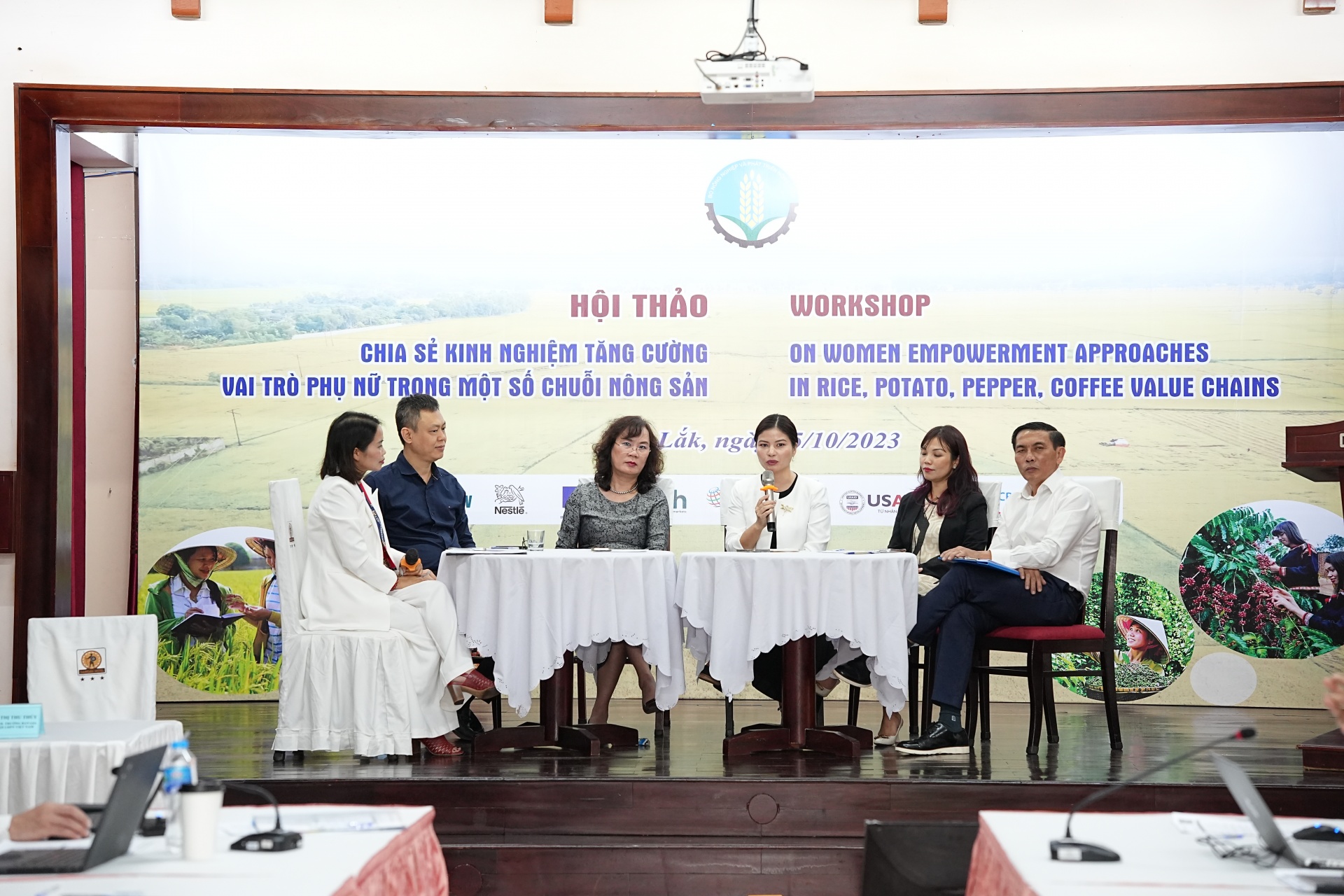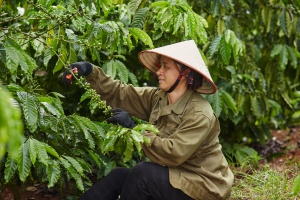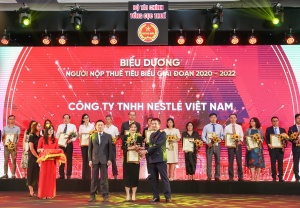Nestlé Vietnam contributes to elevating the role of women across the supply chain
 |
To advance gender equality and women's empowerment in the workplace and throughout the entire supply chain, Nestlé Vietnam, together with the Partnership for Sustainable Agriculture in Vietnam and the Ministry of Agriculture and Rural Development (MARD), organised a workshop on women's empowerment approaches in some agricultural value chains on October 25.
Nguyen Do Anh Tuan, director of the MARD's International Cooperation Department said, "Women are an important labour force in agriculture and rural areas. Enhancing the economic power and position of women in the family and society creates conditions for them to increasingly develop their abilities, access and adapt to new opportunities, and make important contributions to the goals of sustainable agriculture and modern rural areas in Vietnam."
As a pioneer, Nestlé Vietnam has shared the practical models applied to the NESCAFÉ Plan, aiming to enhance women's empowerment and gender equality. According to Le Thi Hoai Thuong, senior corporate affairs manager of Nestlé Vietnam, the NESCAFÉ Plan adopts sustainable coffee farming practices and regenerative agriculture to enhance the quality of Vietnamese coffee beans, reduce emissions, and improve farmers' incomes.
In addition, the NESCAFÉ Plan, deployed in the Central Highlands provinces since 2011, has also contributed to enhancing the role of women in sustainable coffee farming.
Within the framework of the NESCAFÉ Plan, Nestlé organises training to improve knowledge relating to sustainable coffee farming, especially encouraging the participation of women. In the coffee farming sector, women are often direct workers. Therefore, females who master farming techniques will greatly contribute to promoting sustainable and effective agricultural practices.
Nestlé focuses on training female leaders for coffee farmer groups to spread the project's knowledge and experience to other households. By 2022, 274 farmer groups comprising 21,000 farmers will have been established. One-third of the leaders are women.
In addition, the NESCAFÉ Plan also equips women with financial management knowledge and digital applications to manage their business activities. As a result, more than 80 per cent of women have made investment and production decisions, as well as managed farming households' financial reports.
At the conference, Mai Thi Nhung, a female group leader from the NESCAFÉ Plan, shared stories about reaffirming the role and position of women when participating in the programme. She joined the NESCAFÉ Plan in 2015 and held the role of farmer group leader in the Cu Kuin district of Dak Lak province in 2019. She currently manages 72 members, of whom over 42 per cent are local female farmers.
Previously, Nhung's family cultivated coffee according to her parents' traditional practices. With old seedlings, the yield and quality was not high. However, the sustainable farming techniques that were taught through the NESCAFÉ Plan, such as how to select new high-yield, pest- and disease-resistant plant varieties, have helped the family successfully replant and renovate old coffee gardens, improving productivity and the quality of the coffee beans.
As of 2022, Nestlé had helped 21,000 farmers access and adopt sustainable coffee farming practices under the 4C criteria, offering 330,000 training sessions. Thanks to this, incomes have improved by 30-100 per cent compared to before joining the Nescafé Plan.
In addition, the Nestlé Accompanies Women programme, in collaboration with the Vietnam Women's Union, attracted over 4,600 women from rural areas over the 2020-2022 period. The initiative has empowered women in rural areas, equipped them with business skills, and helped them improve their incomes.
Truong Thi Thu Thuy, head of the Family-Society Department under the Vietnam Women's Union Central Committee said, "Vietnam has issued the Law on Gender Equality and many policies to realise its commitment in this area. However, more action needs to be taken to bring these policies to life. The NESCAFÉ Plan is typical of the four-house cooperation model in agriculture. The scheme realises its commitments to gender equality and effectively empowers women through female leadership training and networks of women scientists."
Empowering women and promoting gender equality is one of Nestlé's top priorities. Since 2013, the Nestlé Group has pledged to support Women's Empowerment Principles with UN Women and UN Global Compact.
In 2018, Nestlé Vietnam also signed a specific commitment to support the nation. The goal is to raise awareness about gender equality and women's empowerment, supporting women to engage in all economic activities within the workplace and the community, contributing to building a stronger economy and enhancing the quality of life for women, their families, and society.
Nestlé is committed to building a sustainable future and prosperous communities where the company operates. The company has launched several programmes to focus on gender equality, create job opportunities for the next generation, and address environmental, social, and corporate governance issues.
 | Nestlé claims top spot in 2023 Coffee Brew Index Nestlé ranked first in terms of coffee sustainability in the new 2023 Coffee Brew Index that was published in the Coffee Barometer report. |
 | Nestlé Vietnam promotes sustainable supply chain and logistics Khuat Quang Hung, director of Corporate Affairs at Nestlé Vietnam, at the Logistics Summit 2023, jointly organised by VIR and SLP Vietnam under the auspices of the Ministry of Planning and Investment in Ho Chi Minh City on October 5, shared about Nestlé's approach to sustainability and sustainable logistics. |
 | Nestlé Vietnam again ranks in list of Vietnam's largest corporate taxpayers Nestlé Vietnam has again been recognised for its efforts to maintain business continuity to ensure employment and income for workers while making a significant contribution to the state budget during 2020–2022, despite the myriad challenges posed by the pandemic. |
What the stars mean:
★ Poor ★ ★ Promising ★★★ Good ★★★★ Very good ★★★★★ Exceptional
Themes: Empowering Women
- Female influence still to be attained
- Shaping Vietnam's corporate future: female board members show business excellence
- Nestlé Vietnam contributes to elevating the role of women across the supply chain
- Empowering female leaders in tech: insights and aspirations shared at KPMG Tech Innovator 2023
- Brighter Path programme hosts empowerment meeting for ethnic minority girls
Related Contents
Latest News
More News
- 14th National Party Congress wraps up with success (January 25, 2026 | 09:49)
- Congratulations from VFF Central Committee's int’l partners to 14th National Party Congress (January 25, 2026 | 09:46)
- List of newly-elected members of 14th Political Bureau announced (January 23, 2026 | 16:27)
- 14th Party Central Committee unanimously elects To Lam as General Secretary (January 23, 2026 | 16:22)
- List of members of 14th Party Central Committee announced (January 23, 2026 | 09:12)
- Highlights of fourth working day of 14th National Party Congress (January 23, 2026 | 09:06)
- Press provides timely, accurate coverage of 14th National Party Congress (January 22, 2026 | 09:49)
- Press release on second working day of 14th National Party Congress (January 22, 2026 | 09:19)
- Minister sets out key directions to promote intrinsic strength of Vietnamese culture (January 22, 2026 | 09:16)
- 14th National Party Congress: Renewed momentum for OVs to contribute to homeland (January 21, 2026 | 09:49)

 Tag:
Tag:



















 Mobile Version
Mobile Version